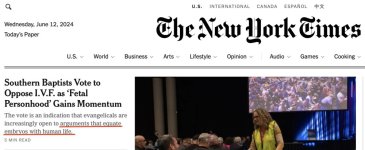Legalized abortion narrowly upheld
Los Angeles Times – June 12, 1986
WASHINGTON - A sharply divided Supreme Court, reaffirming its controversial 1973 decision legalizing abortion, Wednesday struck down a series of Pennsylvania regulations that the Justices said Improperly restricted and discouraged women seeking to end their pregnancies.
In a 5-4 ruling, the court held that the restrictions violated the constitutional right to privacy. The majority turned aside a plea by the Reagan administration to uphold the regulations and to use the case to overrule the 1973 decision, known as Roe vs. Wade.
"The states are not free, under the guise of protecting maternal health or potential life, to intimidate women into continuing pregnancies," Justice Harry A. Blackmun, author of the 1973 ruling, wrote for the court Wednesday.
Although the decision was a substantial setback to the administration and other antiabortion forces, there were indications that support for the 1973 decision within the court may be waning.
In dissent, Chief Justice Warren E. Burger, who had joined the majority in the landmark ruling 13 years ago, called the decision in the Pennsylvania case "astonishing" and for the first time suggested reconsideration of Roe vs. Wade.
Burger's change in position appeared quite likely to fuel speculation that, should there be such an opportunity, a pivotal appointment to the court by President Reagan could eventually lead to the politically volatile 1973 ruling being reversed or significantly modified.
Burger, explaining his shift, said that he had supported the 1973 decision in the apparently mistaken belief the court was not approving "abortion on demand." He said that Wednesday's decision "plainly undermines" that belief and that he had "regretfully concluded" that his concerns over that issue "have now been realized."
"Today the court astonishingly goes so far as to say that the state may not even require that a woman contemplating an abortion be provided with accurate medical information concerning the risks inherent in the medical procedure which she is about to undergo and the availability of state-funded alternatives," the chief justice said.
In another dissent, Justice Byron R. White, joined by Justice William H. Rehnquist, called the 1973 decision "fundamentally mis-, guided" and urged that it be overruled. White accused the majority of reacting "defensively" to criticism of Roe as lacking constitutional support. The court had ignored constitutional principles and "created something out of nothing," he said.
Justice Sandra Day O'Connor, in another dissent also joined by Rehnquist, reiterated criticism she made three years ago by saying that the 1973 decision had proved "unworkable" as a means of regulating abortion. However, O'Connor did not say whether the ruling should be reconsidered or overruled.
The 1973 decision, reached by a 7-2 vote, extended the right to privacy to abortion for the first time, effectively invalidating many state laws that made the operation a criminal offense.
The court said that, in the first three months of pregnancy, the right to abortion was unqualified; in the second trimester, the state could regulate abortion to protect a woman's health; and, in the third, when the fetus was "viable" or able to survive outside the womb, states could prevent abortion when there was no threat to the life or health of the woman.
Since then, the number of abortions performed legally in the United States has grown to 1.5 million annually.
The justices, upholding a ruling by a federal appeals court in Philadelphia, struck down provisions in a Pennsylvania law that would have required that physicians obtain the "informed consent" of patients by telling them of the detrimental physical and psychological effects of abortion and by providing material about agencies available to help them if they decide instead to give birth.


